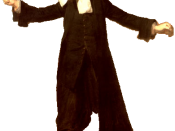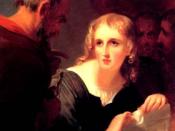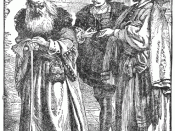Shylock's downfall
Shylock, in the play; The Merchant of Venice, is partially responsible for his downfall. The trickery of the Christians, the legal savvy of Portia and the highly technical nature of the bond were all major factors contributing Shylock's demise, which, as evident in the play, could not have been avoided by Shylock. Shylock's hunger for revenge, his un-planned arrangements, in regards to the legal proceedings and his dealings with the Christians, and his stubbornness in taking the ducats all contributed to his defeat, and were all avoidable. It is, however, particularly noteworthy in the text, that for as many factors which worked against Shylock, and were avoidable, there were far more factors, put in play by the Christians, which were effective in his down-fall. The third major cause, which heavily influenced the outcome of the play, was society.
The primary cause of Shylock's downfall, to which the Christians were responsible, was the trickery which they employed in the court case.
The use of Shylock's hunger for revenge could see Portia as the sole liability in Shylock's demise; however, the factors underlying the face of the problem shine more light on the Christians and Shylock himself.
The first point to consider is that Portia was very much within her rights to seek legal advice and it should have been nothing but anticipated that she do so in such a situation. The understanding which Shylock must have had was that the Christians would have acquired legal advice and under this understanding it would have been a very logical step to seek some legal advice himself. The fact that Shylock did not seek legal advice should indicate strongly to the responder that he should, also, share the blame.
The second point to consider is that the Christians had no more legal knowledge than Shylock and whatever they could have done could have been achieved by Shylock as well. In fact, Shylock's intelligence is shown many times in the play. The first meeting with Antonio proved this firmly. Shylock explains to Antonio, quoting form The Hebrew Scripture, that the use of interest as a means of making money was readily accepted, religiously; "No, not take interest, not, as you would say, / directly interest: mark what Jacob did." (Act 1, Sc. 3). Again Shylock demonstrates his intelligence later in the meeting when he downplays his bond as a gesture of friendship;
Is not so estimable, profitable neither,
As flesh of muttons, beefs, or goats. I say,
To buy his favor, I extend this friendship:
If he will take it, so; if not, adieu;
And, for my love, I pray you wrong me not. (Act 1, Sc. 3)
The final point to consider is that Shylock was unprepared for Portia's arrival into the play. That is, Shylock had no knowledge that such a person even existed. The responder must first remember that no one in the court knew that the lawyer was Portia, not even the Christians themselves. Shylock knew nothing of Portia and he can be considered unprepared, indeed the lawyer was to be an unbiased one and the job of a real lawyer was to uphold the law, not to fight for the Christians.
The legal system of the time was very different to the one in place today. In this court both sides did not require a lawyer, it would be final bargaining point where the plaintiff was asked if he would accept the offer of the defendant in exchange for the termination of the bond. It is already assumed that the bond was genuine and, if there were no objections, it would be executed the same day. In this regard the court was the final point of interaction between the two parties. Indeed, the play itself calls the court one of justice and not one of law; the distinction between these two is that a court of law gives the very strong connotation of abiding by a very strict and technical set of rules whereas one of justice gives the connation of a rather simplistic court where the causes of justice are served.
The one who presides over the court is not called a judge but a duke, his job was to oversee the court but it seems that he had little power in deciding the outcome of the case. When Antonio is in jail, he agrees that; "The duke cannot deny the course of the law" (Act 3, Sc. 3). The Duke is also a very bias one; "I am sorry for thee [Antonio]: thou art come to answer / A stony adversary, an inhuman wretch" (Act 4, Sc. 1).
The job of the supposed 'lawyer' is an ambiguous one. His job is to primarily serve the causes of the law, not of one particular party. In a modern court he would be considered the judge and in some regards the jury, however, he has to justify his findings in agreement with the law and also both parties. Shylock calls him a judge many times; "'Tis very true: O wise and upright judge! How much more elder art thou than thy looks!" (Act 4, Sc. 1). This leads the responders to the belief that a real lawyer would have made an impartial decision.
The lawyer's job, in this case played by Portia, was to see that there was nothing wrong with the bond and that it was executed in accordance with the law. Had a genuine lawyer been present in the court there would have been very little problems for Shylock.
Firstly, the motives of a genuine lawyer would have been to give Shylock his rightful forfeiture, if he did not (without any genuine legal reason); there was the very real danger of a precedence which would have thrown the entire legal system in Venice into disarray.
Secondly, the loop hole that Portia used was a fairly complicated one, one not even seen by the Christians, and especially not by Shylock himself. There would not be such a strong motive for another lawyer to search the bond to such a degree, in fact, the lawyer may have been persuaded not to point out such a technicality in the bond because if he had; other such cases would try to employ a similar degree of scrutiny to their bonds, which would further complicate the law and hence make his job, additionally complicared.
Portia's arrival into the play was a very unexpected one and Shylock's guard may have been severely lowered at such a time. His thirst for revenge was about to be satisfied and his mind was clearly not on the bond, which, it was assumed by all parities concerned, was flawless. Hence, Portia's playing of the system was a very major factor in Shylock's downfall; however, it was certainly preventable.
The simplistic bond which was written up in the beginning of the play could have been very much improved upon, Shylock himself says to Antonio (if not sarcastically) that the writing up of the bond was a mere joke; Go with me to a notary, seal me there / Your single bond; and, in a merry sport, (as a joke)" (Act 3, Sc. 3), if Shylock had taken the bond more seriously he may have written the appropriate parameters for the bond and avoided any such holes. Furthermore, if Shylock had simplistically stated that he could have Antonio's life over the bond the confusion would have certainly been prevented. In the court case Shylock even suggest an alternative method of death to Antonio; "What, wouldst thou have a serpent sting thee twice?" (Act 4, Sc. 1). This method, too, would have given Shylock his wish. Yet once again, Shylock's hast and his thirst for revenge had blinded his judgment.
It seems that Shylock's thirst for revenge is most commonly accountable for his downfall. Shylock's revenge, however, is also due the Christians. It is indeed true that one purpose for writing the play was to display strong anti-Semitic views in Shakespeare's time. The play is very open in this regard, it is not very difficult to see that the Christians hate the Jews and the Jews hate the Christians in the same manor. The true issue of the play, however, is whether it is the fault of the Christians, Jews or society in general. The audience is lead the understanding that society has a larger role, than any other group, in this particular issue.
The hatred of the Jews has run through the ages and had been around long before Shakespeare's time. The theme first emerges when Shylock says at the very beginning of the play; "How like a fawning publication he looks! / I hate him for he is a Christian" (Act 1, Sc. 3). Shakespeare heavily reflected the mood at the time, that is, one of hatred for the Jews and the perception that it was the Jews who were highly active in the separation of the community. Antonio also, makes no secret of his hatred of interest for profit;
Shylock, although I neither lend nor borrow
By taking nor by giving of excess,
Yet, to supply the ripe wants of my friend,
I'll break a custom. Is he yet possess'd
How much ye would? (Act 1, Sc. 3).
This, again, reflects the views of the community but also points out the supposed immorality of the Jews as it was seen by the Christians in this period. The main purpose of Shylock being a money-lender was because, firstly, even though there were no Jewish moneylenders at the time, the moneylenders in London were all hated by the London community. In one thesis it is stated that the money lenders came primarily form Italy and were called Lombard, they were apparently deeply despised. It is also known in the London community's Italian Xenophobia was closely related to their hatred of Jews .
It appears that Shakespeare has shown society their own wrong doings with the Jewish community. It is up to the audience to make up their minds about what this means about the community in general, however, to draw such a conclusion the responder must take into account a number of factors.
The first factor which must be taken into consideration is what acts the Christians, in particular, Antonio, had originally performed against Shylock that caused his great hatred of them; it is obvious that such a strong hatred cannot simply blamed on the Jews, the actions of the Christians must be firstly taken into consideration and then weighed against society and any prejudice that Shylock may have had in the first place. Evidently the Christians have been extremely active in provoking Shylock. Exceedingly telling is the first meeting with Antonio where Shylock describes the Christian's wrongdoings; "You call me misbeliever, cut-throat dog / And spit upon my Jewish gabardine" (Act 1, Sc. 3). Also, the Christians continually taunt Shylock over their 'victory' concerning his own daughter. In one scene Salanio taunts Shylock; "And Shylock, for his own part, knew the bird was fledged; and then it is the complexion of them all to leave the dam" (Act 3, Sc. 1).
It can be seen through the text that society has a large role in the hatred Shylock has for the Christians. Because Shylock is a Jew it is assumed by the Christians that he is a bad Character. This is demonstrated many times in the text when the Christians call Shylock a devil. The first of these incidents occur when Antonio corrects Shylock on his justification of interest: "The devil can cite Scripture for his purpose. / An evil soul producing holy witness / Is like a villain with a smiling cheek". (Act 1, Sc. 3) The second incident occurs when Salanio sees Shylock coming his way: "Let me say 'amen' betimes, lest the devil cross my / prayer, for here he comes in the likeness of a Jew." (Act 3, Sc. 1). The third occurrence is with Shylock's own daughter, Jessica: "Our house is hell" (Act 2, Sc. 3). It is evident that Shylock's hatred is simply a return of the Christian's. However, their hatred originates heavily form society stereotypes and common perceptions. A literary expert in his thesis on the Merchant of Venice states that Shakespeare's true purpose for the play was to show the corrupt views of the Christians. .
Shakespeare himself would have not held these views but rather reflected upon the views of society at the time. Indeed Shylock has inherited many of societies' stereotypes which would have been commonly labeled on Jew; he is portrayed as an immoral, money loving father who could not keep his own daughter but wished her death upon the return of his jewels. In this respect, society has endowed Shylock with all its bad qualities. In one address a Shakespearian critic looks at the use of the law to justify the pound of flesh and concluded that Shylock has; "a powerful paean for any group on the margins of society. Shylock, too, shared some of the rev. Martin Luther king's dream, though, perhaps, less enthusiastic for rev. king's passive means ."
It is clear that the society out of the play has heavily influenced the character of Shylock but as for the society within the play; it is also evident that the Christians have taken a strong disliking to him for no particular reason but simply because he is a Jew. This in itself is a stereotype. Shylock, on the other, provides additional reasons for hating Antonio. For example he details how Antonio has lent out money without any interest; "But more for that in low simplicity / He lends out money gratis and brings down / The rate of usance here with us in Venice." (Act 1, Sc. 3). Also Shylock declared; "Thou [Antonio] call'dst me dog before thou hast a cause" (Act 3, Sc. 3).
Hence, Shylock's hatred for the Christians can be blamed on the Christian's hate of the Jews, which society, it is apparent, has placed on them. The Christian's can be blamed to an equal extent as society as they themselves have chosen to accept such a stereotype. It can be equally as easy to reject the false doctrines of society as to accept them.
The final factor in the causality of Shylock's downfall is his ignorance in the court case. It is clear that his monetary situation was dire and he was obviously in need of some money very quickly, furthermore, the money offered was much more than what was paid and it would have been very wise, economically and for purposes of revenge, if Shylock had taken the money.
From the outset of the second act it is clear that Shylock is no longer so financially stable. He describes; "[Jessica,] fled with a Christian! O my Christian ducats" (Act 2, Sc. 8). Later in the scene he goes on to describe further; "And Jewels - two stones, two rich and precious stones." (Act 3, Sc. 8); and still further; "A diamond gone cost me two thousand ducats in Frankfurt!" (Act 3, Sc. 1). Shylock even goes as far as to wish death upon his daughter; "I would my daughter / were dead at my foot, and the jewels in her ear! / would she were hearsed at my foot, and the ducats in / her coffin!" (Act 3, Sc. 1).
Portia pleads, rather excessively, to Shylock to accept the alternate deal; "For thy three ducats here is six." (Act 4, Sc. 1) but Shylock, rather greedily refuses the deal; "If every ducat in six thousand ducats / were in six parts, and every part a ducat, / I would not draw them; I would have my revenge" (Act 4, Sc. 1). This can only further provide evidence to the audience that Shylock's thirst for revenge is extremely strong but it also proves that Shylock's behavior in the court was exceptionally irrational and it is certain that if he would have acted more rationally the outcome of the case would have been significantly different.
The audience, at the end of the play, has the understating that Shylock had a very minor part in his downfall. The rest of the blame can be placed upon the Christians especially Portia and Antonio. The major factor in Shylock's demise was, however, society and it's assumptions about Jews. This heavily reflects the sentiments during Shakespeare's time and his portrayal of the Jewish character in the play; The Merchant of Venice also is consistent with the stereotypes. Shakespeare uses Shylock to show society their own mistreatment of minorities and hence Shylock can be thought of as the hero, a martyr, of the play.



I would have preferred one comprehensive essay
I thought your essay was good and rated it as such. However, after reading your other two essays on the same subject which you submitted in the past couple of days (called "To what Extent Is Shylock Responsible For His Downfall In The Play The Merchant Of Venice" and "'Shylock's Downfall": Is Shylock responsible for his downfall in Shakespeare's play The Merchant Of Venice?"), I feel the content of all three essays could have been combined into one thorough essay which would not have been overly long.
7 out of 7 people found this comment useful.